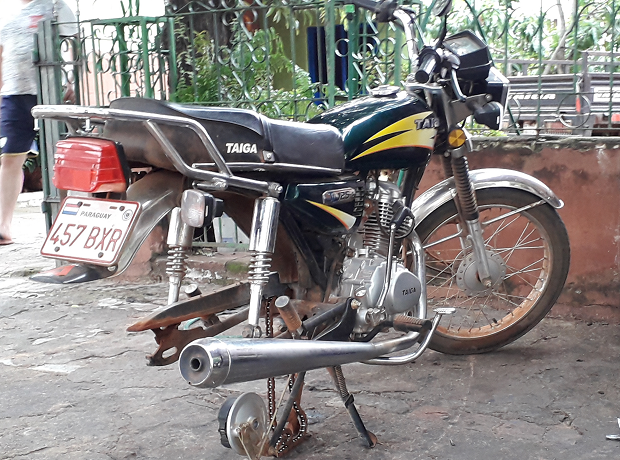In Paraguay some sort of transport is essential. There are plenty of buses but out in the countryside they only run at certain hours and to certain places.
Independent mobility is a much better option. As with anywhere else in the world everything from bicycles to lorries is available. Something to suit everyones budgets and requirements.
For me that means a small motorbike. Spending much of my time on rough dirt roads a bicycle would prove very hard work and anything less than a sturdy 4×4 car would get shaken to bits within a few months.
There is also another reason for opting for a small motorbike. Ease of repair. The more complicated a vehicle is the less suitably skilled and equipped mechanics there are to be found. Additionally any spares required might not be available locally.
To avoid any such problems with spares and repairs my transport is that of the locals. A cheap Chinese bike.
There are several brands available. They are however all basically the same. Generic Chinese bikes the same as can be found throughout the world.
Some are constructed in Paraguay and others are imported complete. The differences between the brands though are on the whole little more than cosmetic. Slightly different parts originating in different Chinese factories.
The various brands under which the bikes are sold are well known across Paraguay. Mine is a Taiga. Another brand trying to sound like a large fierce cat is the Leopard. There is though no Lion. Three Lions being a very well know locally produced spirit, and so probably an inappropriate name for a vehicle.
Probably the worst name though is not one borrowed from nature. Instead it is from the world of transport. Two names cobbled together and given to a motorbike that is neither. That is the Yamazuki.
All these bikes are so similar and so simple that a mechanic anywhere in Paraguay with a basic set of tools can handle any of them. Furthermore the knowledge required is how to repair a bike rather than how to repair a certain brand.
As such anyone who fancies him self as a mechanic can set himself in business. With initially just the very simplest of tools and at no great expense.
The effect of this is a great number of motorcycle repair shops. Every town has dozens and unless well out in the countryside you are never any distance from at least one. On the road into Piribebuy almost every other business is a motorcycle repair shop.
Obviously with some many people claiming to be mechanics standards vary from place to place. Word of mouth though ensures good garages have a steady flow of clients while the poor ones fade away.
The amount of competition this generates and the generic nature of the parts work together to keep prices down. Anyone attempting to raise their prices would really have to offer something special to stop customers immediately moving to one of his rivals.
Unless I have something that needs fixing at the nearest garage such as a puncture I always return to the same garage and the same mechanic. Building a relationship ensures that the standard of work remains high and the costs constant.
The bikes are rugged enough to cope with the roughest of terrain but being such simple machines do require regular services to keep them running well. About every 1500km an oil change and complete service.
That is Paraguay is not something that needs booking. Instead I just pull up at the garage with a fresh bottle of oil and take a seat. Then while I wait the valves are cleaned and adjusted. The air filter is cleaned. The chain and brakes all tightened nad then the old oil replaced with new.
Unless there happens to be a queue in the garage the whole business takes little more than half an hour.h
Other jobs such as the repairing of punctures necessitate visiting the nearest available garage. With all the bikes being basically the same those jobs to can be handled at any garage.
When the bikes are running well. Which they normally are. They are the ideal transport for getting around the Paraguayan countryside. Happy to tackle the smallest and poorest of dirt tracks and so stripped of complicated and delicate parts that there is little to break if they do fall over.
As for the cost of owning and running a bike. That is very reasonable. To purchase new, no more than a few hundred pounds. Then to keep running. A few litres of petrol are good for a couple of hundred kilometres.
They are though most at home in the countryside. Crowded city streets are not their natural habitat. If I wish to travel any further than the few nearest towns a bus would be a much safer and more secure way of doing so.


Recent Comments